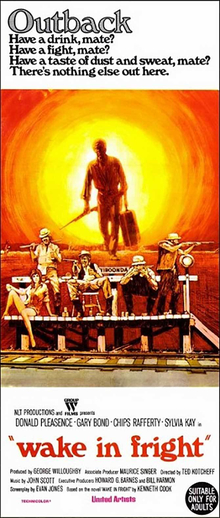
Back استيقظ خائفا (فيلم) Arabic Wake in fright Catalan Wake in Fright Welsh Ferien in der Hölle (1971) German Wake in Fright Spanish Wake in Fright Basque بیدارشدن در وحشت Persian Réveil dans la terreur French Félelemben élni Hungarian Nattens jegere NB
| Wake in Fright | |
|---|---|
 Australian daybill film poster | |
| Directed by | Ted Kotcheff |
| Screenplay by | Evan Jones[a] |
| Based on | Wake in Fright by Kenneth Cook |
| Produced by | George Willoughby |
| Starring | |
| Cinematography | Brian West |
| Edited by | Anthony Buckley |
| Music by | John Scott |
| Color process | Technicolor |
Production companies | |
| Distributed by | United Artists |
Release dates | |
Running time | 109 minutes[3] |
| Countries |
|
| Language | English |
| Budget | A$700,000–800,000[3][6] |
| Box office | |
Wake in Fright (initially released as Outback outside Australia) is a 1971 Australian New Wave film directed by Ted Kotcheff, written by Evan Jones, and starring Gary Bond, Donald Pleasence, Chips Rafferty, Sylvia Kay and Jack Thompson. Based on Kenneth Cook's 1961 novel of the same name, it follows a young schoolteacher who descends into personal moral degradation after finding himself stranded in a brutal, menacing town in outback Australia.
Filmed on-location in Broken Hill and Sydney, Wake in Fright was an international co-production between Australia, Britain,[9] and the United States.[10][11] Alongside Walkabout, it was one of two Australian films to be nominated for the Grand Prix du Festival at the 24th Cannes Film Festival. Despite attracting positive reviews at the time, the film was a commercial failure in Australia, in part due to scant marketing by United Artists, as well as controversy surrounding its portrayal of outback life, including a hunting scene in which real kangaroos are shot and killed.
By the 1990s, Wake in Fright had developed a cult reputation as Australia's great "lost film" because its master negative had gone missing, resulting in censored prints of degraded quality being used for its few television broadcasts and VHS releases. After the original film and sound elements were rescued by editor Anthony Buckley in 2004, the film was digitally remastered and given a 2009 re-release at Cannes and in Australian theatres to widespread acclaim; it was issued commercially on DVD and Blu-ray later that year. Wake in Fright is now considered a pivotal film of both the Australian New Wave[12] and the Ozploitation cycle,[13] earning praise from contemporary critics for Kotcheff's direction and the cast's performances.[14]
Wake in Fright was remade as a two-part miniseries that aired in 2017.
- ^ Wake in Fright (Audio commentary with Ted Kotcheff and Anthony Buckley) (DVD). Richmond, Victoria: Madman Entertainment. 1971.
- ^ "One UA, 3 Columbia Films Are Exhibited at Cannes". BoxOffice. May 31, 1971. E-2. "The Cannes Film Festival, which ended Thursday (27) got under way on May 13 with an opening night presentation of 'Outback,' a United Artists release which was the official Australian entry."
- ^ a b c "Wake in Fright". Ozmovies. Retrieved 2 September 2017.
- ^ Greenwood, Pepita (2006). "Wake in Fright (a.k.a) Outback". Oz Film Database. Murdoch University. Retrieved 4 September 2017.
- ^ "Wake in Fright (1971)". BFI. Archived from the original on 11 August 2016. Retrieved 20 May 2021.
- ^ "Wake in Fright: 2009 Restoration". National Film and Sound Archive. Retrieved 3 December 2020.
- ^ "Australian Films At the Australian Box office" (PDF). Film Victoria. Archived from the original (PDF) on 20 March 2012. Retrieved 12 September 2012.
- ^ "Wake in Fright (2012)". Box Office Mojo. Retrieved 13 October 2017.
- ^ "Wake in Fright (1971)". BFI. Archived from the original on 11 August 2016. Retrieved 20 May 2021.
- ^ "Wake in Fright (1971) - Overview". AllMovie. Retrieved 29 September 2020.
- ^ "AFI Catalog - Outback". American Film Institute. Retrieved 29 September 2020.
- ^ Rapold, Nicolas (4 October 2012). "'Wake in Fright' and Australian New Wave", The New York Times. Retrieved 12 January 2012.
- ^ Buckmaster, Luke (14 February 2022). "The 17 greatest Ozploitation movies – sorted". The Guardian. Retrieved 20 March 2012.
- ^ "Wake in Fright Movie Reviews". Rotten Tomatoes. Retrieved 23 December 2012.
Cite error: There are <ref group=lower-alpha> tags or {{efn}} templates on this page, but the references will not show without a {{reflist|group=lower-alpha}} template or {{notelist}} template (see the help page).